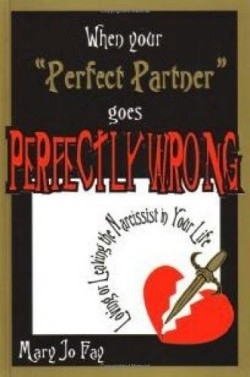
When Your Perfect Partner Goes Perfectly Wrong
Loving or Leaving the Narcissist in Your Life
Narcissists are needy people who do not negotiate well for what they want. They manipulate, wheedle, threaten, sulk, and punish in order to get an unfair share of recognition, status, and love. They succeed surprisingly often, thanks to partners who are awed, gullible, self-blaming, and hapless-stuck in what the author calls a “boxx.”
Fay, who has a master’s degree in nursing, writes as “a survivor of several narcissists.” She attributes her awakening to a confessed narcissist, Sam Vaknin, PhD, whose website and book Malignant Self Love opened her eyes to distressing facts that she spells out vividly to help others like herself. Most victimized partners are women, but some men are represented in this stirring, disturbing collection of self-portraits of intelligent, articulate, loving partners who tried to give everything just to get an emotional pittance from narcissists.
The unflattering term “narcissism” takes its name from the Greek myth of Narcissus, a perfectly beautiful youth who spurned all the young women who offered themselves, including the loveliest nymph, Echo. He was punished by a curse of falling in love with his own image: seeing his reflection in a pool of water, he was transfixed until he died, love struck by his own likeness. In death he was transformed into the flower that bears his name.
Self-love is not all bad, and healthy people have a measure of it derived from childhood needs and feelings, but accompanied by a perspective that not only permits but enhances the capacity to love others. Those who do not develop that capacity may have been overindulged or abandoned at a crucial age: either extreme apparently can result in a personality disorder.
Fay brings to life these miserable, isolated people and their victims, whom she asks to consider why they stay; why they are not entitled to fair treatment; why they put up with abuse, never feeling equal; why their needs are not important; why they don’t recognize and protect their own boundaries. She cannot tell anyone to leave a particular relationship, but urges this ultimate question: “Do I really want to spend the rest of my life this way?”
People in happy relationships may wonder why a friend is unable to leave a bad one. They understandably become frustrated when their logical, supportive advice is not taken. This book, by one who learned from painful experience, can help those who are struggling with similar travail, and provide insight for those who look on, feeling helpless. At least now they can recommend an excellent book.
Reviewed by
E. James Lieberman
Disclosure: This article is not an endorsement, but a review. The publisher of this book provided free copies of the book to have their book reviewed by a professional reviewer. No fee was paid by the publisher for this review. Foreword Reviews only recommends books that we love. Foreword Magazine, Inc. is disclosing this in accordance with the Federal Trade Commission’s 16 CFR, Part 255.
